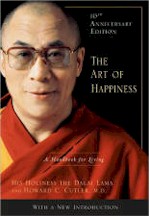 |
|
|
| ||||||
|
|
This page is the original source of this review, though you may also find it on Amazon or other sites. | ||
| Book Reviews Home | Free Audio Books | |
 |
Book Review of: The Art of HappinessA Handbook for Living Price:
$14.34 Availability: Usually ships
within 24 hours |
| Review
of
The Art of Happiness, by Author (Hardcover, 1998) (You can print this review in landscape mode, if you want a hardcopy) Reviewer: Mark Lamendola, author of over 6,000 articles. The subtitle and attributions of this book are not accurate:
I'm not sure the title is correct, either. The book isn't on the art of happiness per se. This book should be titled, "My Commentary on Interviews with the Dalai Lama." An appropriate subtitle might be, "We discussed elements of happiness." The book does contain excellent advice and insights. But contrary to the subtitle's implied promise, it doesn't provide a program for reaching a state of happiness. The author does describe some exercises, but as a third party observer watching the Dalai Lama take an audience through them. That's not the same as a "handbook" that would explain exercises and organize them into some kind of useful structure. The author's obviously false modesty is annoying. Unless he got his PhD by mail order, his anecdotes about his lack of mental acuity are not believable. It would have served the reader better if he'd contrasted a "difficult" Buddhist concept against related Western concepts. Or, in keeping with the bar we set for PhDs, he could have just explained why the concept might be misunderstood or not apparent. I think, instead, he was pandering to an imagined reader about whom he made assumptions that are not necessarily so.
Overall, though, the book is worth reading. After all, we are getting a glimpse of one of the world's spiritual and religious leaders. We get his thoughts on some interesting. perhaps life-changing, questions. Dr. Cutler does communicate to the reader what the Dalai Lama recommends for individuals to find their own path to happiness. He also discusses some common mistakes and why those end up as dead ends. I think if you're struggling with trying to make sense of life, or you find yourself not very happy as you go through each day, this book can help you figure out how to climb out of the pit. But it's not a manual that will tell you where the handholds are on the way up. From the Dalai Lama's comments, it's clear he doesn't think such a manual is possible. Not that I'm an expert, but it so happens I agree with him. | |
About these reviewsYou may be wondering why the reviews here are any different from the hundreds of "reviews" posted online. Notice the quotation marks? I've been reviewing books for sites like Amazon for many years now, and it dismays me that Amazon found it necessary to post a minimum word count for reviews. It further dismays me that it's only 20 words. If that's all you have to say about a book, why bother? And why waste everyone else's time with such drivel? As a reader of such reviews, I feel like I am being told that I do not matter. The flippancy of people who write these terse "reviews" is insulting to the authors also, I would suspect. This sound bite blathering taking the place of any actual communication is increasingly a problem in our mindless, blog-posting Webosphere. Sadly, Google rewards such pointlessness as "content" so we just get more if this inanity. My reviews, contrary to current (non) standards, actually tell you about the book. I always got an "A" on a book review I did as a kid (that's how I remember it anyhow, and it's my story so I'm sticking to it). A book review contains certain elements and has a logical structure. It informs the reader about the book. A book review may also tell the reader whether the reviewer liked it, but revealing a reviewer's personal taste is not necessary for an informative book review. About your reviewer
About reading styleNo, I do not "speed read" through these. That said, I do read at a fast rate. But, in contrast to speed reading, I read everything when I read a book for review. Speed reading is a specialized type of reading that requires skipping text as you go. Using this technique, I've been able to consistently "max out" a speed reading machine at 2080 words per minute with 80% comprehension. This method is great if you are out to show how fast you can read. But I didn't use it in graduate school and I don't use it now. I think it takes the joy out of reading, and that pleasure is a big part of why I read. |
| |||||